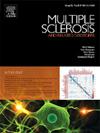妊娠在复发缓解型MS预后中的作用:一项为期五年的研究
IF 2.9
3区 医学
Q2 CLINICAL NEUROLOGY
引用次数: 0
摘要
多发性硬化症(MS)经常影响生育年龄的妇女,导致人们对妊娠与MS进展之间的相互作用越来越感兴趣。妊娠与MS预后之间的关系已被广泛研究,但长期预后仍存在争议,研究结果相互矛盾。目的本研究旨在通过检查复发率、扩展残疾状态量表(EDSS)评分和分娩后3年和5年的MRI活动,评估妊娠对MS预后的长期影响。方法回顾性分析111例经多发性硬化症诊断后早产或足月分娩的多发性硬化症(wwMS)妇女。参与者被分为怀孕期间没有复发的(NRG)和有复发的(RG)两组。选取人口统计学和临床特征相匹配的85例非妊娠wwMS (NPG)作为对照组进行比较分析。收集临床资料,如复发率、EDSS评分、MRI检查结果,并进行统计分析,以确定妊娠对ms的潜在影响。结果在诊断为ms后分娩的妇女中,11例在妊娠期间复发。三组在孕前年复发率、EDSS评分、诊断年龄、妊娠年龄、寡克隆带阳性、首发症状定位或疾病改善治疗使用方面无显著差异(p >;0.05)。与NPG组相比,NRG组和RG组在分娩后的前3年和5年的复发明显更多(p <;0.05)。此外,RG组在分娩后第三年的复发率高于NRG组(p <;0.05)。结论:多发性硬化症诊断后分娩与复发活动增加有关,尤其是产后3年内。然而,这种复发活动的增加似乎不会导致wwMS的长期残疾积累和MRI活动。这些发现支持个性化产后监测的重要性。本文章由计算机程序翻译,如有差异,请以英文原文为准。
The role of pregnancy in relapsing-remitting MS prognosis: A five-year study
Introduction
Multiple sclerosis (MS) frequently affects women during their reproductive years, leading to growing interest in the interaction between pregnancy and MS progression. The relationship between pregnancy and MS prognosis has been widely studied, yet long-term outcomes remain controversial, with studies presenting conflicting results.
Aim
This study aims to assess the long-term impact of pregnancy on MS prognosis by examining relapse rates, Expanded Disability Status Scale (EDSS) scores, and MRI activity over three and five years after delivery.
Method
A total of 111 women with MS (wwMS) who delivered either preterm or at full term after MS diagnosis were retrospectively studied. The participants were grouped into those who experienced no relapses during pregnancy (NRG) and those who did (RG). A control group of 85 non-pregnant wwMS (NPG) with matched demographic and clinical characteristics was included for comparative analysis. Clinical data such as relapse rates, EDSS scores, and MRI findings were collected and analyzed statistically to determine the potential impact of pregnancy on MS.
Result
Of the women who delivered post-MS diagnosis, 11 experienced relapses during pregnancy. There were no significant differences between the three groups regarding prepregnancy annualized relapse rate, EDSS scores, age at diagnosis, age at pregnancy, oligoclonal band positivity, first symptom localization, or disease-modifying therapy use (p > 0.05). Both the NRG and RG groups experienced significantly more relapses compared to the NPG group during the first three and five years post-delivery (p < 0.05). Additionally, the RG group had a higher relapse rate in the third year after delivery compared to the NRG group (p < 0.05).
Conclusion
Having a delivery after an MS diagnosis is associated with increased relapse activity, particularly within the first three years postpartum. However, this heightened relapse activity does not appear to contribute to long-term disability accumulation and MRI activity in wwMS. These findings support the importance of individualized postpartum monitoring.
求助全文
通过发布文献求助,成功后即可免费获取论文全文。
去求助
来源期刊

Multiple sclerosis and related disorders
CLINICAL NEUROLOGY-
CiteScore
5.80
自引率
20.00%
发文量
814
审稿时长
66 days
期刊介绍:
Multiple Sclerosis is an area of ever expanding research and escalating publications. Multiple Sclerosis and Related Disorders is a wide ranging international journal supported by key researchers from all neuroscience domains that focus on MS and associated disease of the central nervous system. The primary aim of this new journal is the rapid publication of high quality original research in the field. Important secondary aims will be timely updates and editorials on important scientific and clinical care advances, controversies in the field, and invited opinion articles from current thought leaders on topical issues. One section of the journal will focus on teaching, written to enhance the practice of community and academic neurologists involved in the care of MS patients. Summaries of key articles written for a lay audience will be provided as an on-line resource.
A team of four chief editors is supported by leading section editors who will commission and appraise original and review articles concerning: clinical neurology, neuroimaging, neuropathology, neuroepidemiology, therapeutics, genetics / transcriptomics, experimental models, neuroimmunology, biomarkers, neuropsychology, neurorehabilitation, measurement scales, teaching, neuroethics and lay communication.
 求助内容:
求助内容: 应助结果提醒方式:
应助结果提醒方式:


